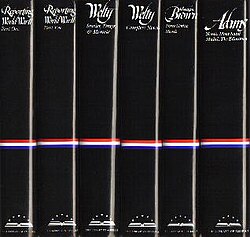
A plop on the doormat and Volume 177 in the Library of America is in the house: Edmund Wilson’s writings from the 1930s and 1940s, including Classics and Commercials, The Triple Thinkers and The Wound and the Bow. There is something appropriate and even – without wanting to be corny about it – moving about seeing Wilson take his place in the Library of America. The Library was his idea: he lobbied hard for non-academic, reader-friendly editions of American classic writers, in ‘complete and compact’ form. ‘It is absurd that our most read and studied writers should not be available in their entirety in any convenient form,’ he argued. The project was modelled on the French Pléiade, and it shows, in the conception, the look and feel of the books and in the beautiful quality of the binding and printing. The Library has filled its mission admirably and most of America’s acknowledged great writers are represented. (The omissions smack of rows over royalties and copyright: no Ernest Hemingway, no Emily Dickinson, no Marianne Moore.) Some have even argued that the brief has been stretched too far. Wilson’s canonisation came after those of Charles Brockden Brown, H.P. Lovecraft, James Weldon Johnson, George Kaufman, William Bartram and Theodore Roosevelt. He might not have been too chuffed about that.
I am an abject fan of the Library. I own, I find, ten of its volumes: three of Parkman, one each of Henry James, Adams, Baldwin, Frost and Stevens, the new Wilson, and an anthology of writing about baseball. The books are lovely, lovely objects. They are about the nicest books I have. American books are in general printed to much higher standards than British books. (Ask publishers about that, and they always say that it’s to do with economies of scale: five times as big an audience equals higher print runs equals lower costs equals the possibility to make nicer books. So they say.) The Library takes that tendency about as far as it will go: it’s hard not to take the volumes down from the shelves and stroke them, like a Bond villain fondling a cat.
What is really hard, though, is to read them. The books are so gorgeous, so marmoreal, that I find them unreadable. Not unreadable in the Pierre Bourdieu/Edward Bulwer-Lytton sense, and not unreadable in theory – I want to read them, I really do. It’s just that in practice, I don’t. I once got about a quarter of the way through Parkman’s Oregon Trail and have made two or three failed attempts on Adams’s novel Democracy, but never made it more than about five pages in. Apart from that, it’s been a total bust. As for the Pléiade, my record of ownership is fairly strong, but equally unblemished by actual reading. I have six volumes: three of Proust, two of Simenon, and one of Taoist philosophy (don’t ask). If pressed, I would say that the Pléiade volumes are theoretically more readable, or less not-readable, than the Library of America; something to do with the sexily diminutive format. This is pure theory, however. In practice they are both equally easy to not-read.
That makes 16 volumes of beautifully produced and entirely unread great writing. What is it about these amazingly gorgeous books that makes one not want to read them? Perhaps it’s to do with having a palate corrupted by paperbacks. I buy more hardbacks now that they’re cheaper – sales figures suggest lots of us do – but in my head I still think that the paperback is somehow the real form of a book. It has a cheapness and democratic availability, and it doesn’t matter if you drop it in the bath or lose it or discover that it’s been ‘borrowed’. I can’t shake off the sense that a hardback is a slightly over-posh relative of a real book. Also, there’s the sheer density of matter in these LoA/Pléiade volumes: a thousand pages a pop. This makes them very good value – the Simenon was cheaper than buying the equivalent volumes in paperback – but when you’re reading them there’s a demoralising sense that, as they say when you flunk a driving test, you’re ‘failing to make due progress’.
A paperback is a paperback; the collected writings of a writer, any writer, have the air of belonging to Culture in the abstract. That’s off-putting. With cheap and cheerful editions it seems natural to move around from the latest overpraised tripe to masterpieces you should have read years ago. This might be one reason classics publishing has so thrived in paperback. Penguin Classics (for whom I briefly worked, I should declare) is, in terms of overall sales and the ability to keep books in print indefinitely, the most successful publishing list in the world. Part of that must be to do with a sense that the books are easy to pick up and put down; literally and metaphorically, not too heavy.
There’s a risk that memorialising writers, consigning them to Culture, is a way of ignoring them. It would be interesting to hear a view about that from the man who observed in 1943, of the time after the end of the First World War, that ‘the shadow of Big Business that had oppressed American culture in our childhood seemed finally to be passing away.’ ‘Finally’ might, with the benefit of hindsight, have been premature. But Wilson had a lot to say about a lot of things, and he was right more often than he was wrong. One of the legacies of the Civil War, he thought, was that ‘whenever we engage in a war or move in on some other country, it is always to liberate somebody.’ As for Library of America Volume 177, he’d have loved the actual book. Given his way of tackling writers by starting at the beginning and carrying straight on through, he might even have read it.
No comments:
Post a Comment